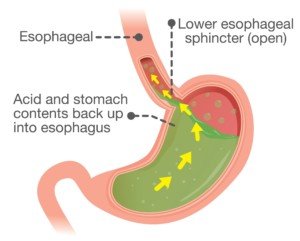Find out why hard running causes a burning sensation in your chest.
What causes “burning” in the chest (or lungs) from running?
“From a digestive point of view, hard running may cause burning in the chest through various mechanisms,” begins Steven Fleisher, MD, a gastroenterologist in Rosedale, Maryland, with 20+ years of experience.
“Unfortunately, most research associating chest pain, burning or discomfort and exercise focus on the heart.
“And since the heart and the esophagus share a common nerve supply, distinguishing between cardiac and esophageal chest discomfort may prove difficult since exercise may provoke both.”
Nerve Involvement
“The sensation of ‘burning’ implies a nerve, or inflammatory (nerve irritation) cause of the pain.
“In my opinion, the following are the three most likely esophageal mechanistic causes of chest burning that may be exacerbated by hard running.”
#1. Reflux
“Gastroesophageal reflux tops the list and is responsible for causing chest discomfort in upwards of 30% of patients complaining of chest pain at baseline.

Acid reflux. Shutterstock/solar22
“Hard running after a large meal or eating while running may predispose to reflux and chest burning through mechanisms that include increased abdominal pressure associated with the respiratory effort of hard running, as well as the type of food consumed before or during running.
“Food types that are spicy or high in fat concentration may lower the pressure in the valve at the end of the esophagus and predispose to regurgitation, irritation and chest burning.
“Other factors promoting reflux include delayed emptying of the stomach secondary to reduced blood flow, impaired secretion of protective factors by the stomach and esophageal lining.”
#2. Esophageal Hypersensitivity
“Secondly, patients may have baseline esophageal hypersensitivity with lower threshold for esophageal burning in response to normal secretions; this may be exacerbated by exercise.”
#3. Dysmotility
“Thirdly, and more speculatively, hard running may induce abnormal contraction (dysmotility) of the esophagus that is often associated with chest discomfort.”
Other Causes
“Chest burning can also be associated with non-digestive causes including airway irritation particularly in cold weather, or when hard running is undertaken when not physically fit or accustomed to the respiratory effort associated.”
For some people, they may find that over time, as they improve their cardiovascular condition, the burning sensation in their chest (or lungs) will disappear.
Consistency with running is key.
Realize that you may become quite adapted to a particular cardio mode such as running fast on level courses or running up hills.
But then, for the first time in ages you decide to do “sprints” on an elliptical machine.
Don’t be surprised if this change in mode shocks your body and produces that chest or lung burning sensation.
Dr. Fleisher was named a 2015-2018 “Top Doc” by Baltimore Magazine for gastroenterology.
 Lorra Garrick has been covering medical, fitness and cybersecurity topics for many years, having written thousands of articles for print magazines and websites, including as a ghostwriter. She’s also a former ACE-certified personal trainer.
Lorra Garrick has been covering medical, fitness and cybersecurity topics for many years, having written thousands of articles for print magazines and websites, including as a ghostwriter. She’s also a former ACE-certified personal trainer.
Chest Pain: Persistent vs. Intermittent vs. Sharp vs. Dull Ache
Chest Pain with Trouble Swallowing: Dangerous & Benign Causes













